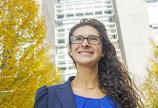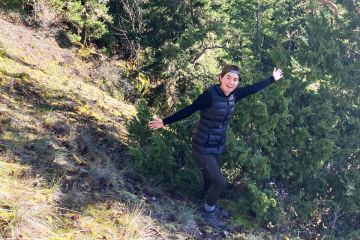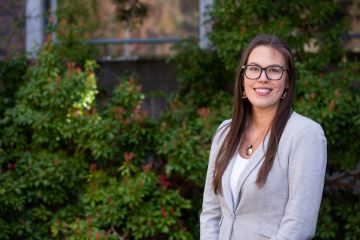Fuel cell-powered studies
- Suzanne Ahearne

Co-ops confirm international student’s career choice in engineering
When Anaïssia Franca transferred to UVic after the second year of her engineering science program in France, communicating was her biggest challenge.
“I had a good understanding of English—but trying to contribute my ideas in group projects when you’re the only woman and there’s a language barrier? That was very hard,” she says.
“It forced me out of my comfort zone but in the end, I see that it was the group projects that contributed the most to my learning,” says Franca, who graduates with her mechanical engineering degree this month. “That, and the co-ops.”
Wanting international experience, Franca was drawn to UVic for its co-op program.
“No one in my family was in engineering. I knew nothing about it really,” she says. “So how could I really know if I wanted to be an engineer?”
For her first co-op work term, she worked with Dr. Ned Djilali, Canada Research Chair in Advanced Energy Systems Design and Computational Modeling. Franca learned to program and use mathematic tools to do simulations and post-processing of data for research about bringing wind power into the electrical grid.
She won the Jamie Cassels Undergrad Research Award and, for the second part of her co-op, worked on modelling fuel cells. That led her to Automotive Fuel Cell Corporation (AFCC), the Ford-Daimler joint venture in Burnaby.
At AFCC, she took on design-oriented projects to predict the performance of fuel cells.
“I’m not much of a hands-on person, I’m more of a theoretical person,” says Franca, who prefers simulation tools to parts machining—an anomaly in mechanical engineering.
Franca—an auto-didact at heart—says she prefers not to ask questions. “When I figure it out by myself, I remember it and it’s inside of me and it creates a natural path to recall next time,” she says.
The only undergrad in her team at AFCC, she taught herself a coding language and, when she was tasked with figuring out why a 3D printer wasn’t working, she fixed it.
“For my final co-op, I wanted to work in a start-up. And,” she says, “since I was a mechanical engineer after all, I needed some hands-on experience!”
She found a great match with Revolution 3D Printers, a local startup bringing a 3D printer to market. They’ve since relocated to a commercial space, but when Franca interviewed for a co-op job there this spring, headquarters was the basement of CEO Warren Strome’s Sidney home; it had the air of Steve Jobs’ proverbial garage. She saw 3D printers and parts everywhere and an exciting opportunity to diversify her skills.
In short order, she set up the company’s help desk, wrote tech support documentation and an operations manual, and used her design skills to create a 3D-printed cover for the 3D printer’s power supply.
Franca has already entered grad studies, working at the UVic Institute for Integrated Energy Systems, looking for ways to integrate a large fleet of electric vehicles into a smart-grid system.
Franca’s observation about the value of group projects extends beyond the math and mechanics of engineering. Back in the corridors of the engineering office wing, she also discovered a comfortable couch and an empty room that used to house the defunct UVic chapter of Engineers Without Borders. She and two others restarted the club—and now she and more than 20 of her colleagues are also using their engineering skills to address broader issues of poverty and systemic problems around the world.
Photos
In this story
Keywords: convocation, student life, sustainability, co-op





